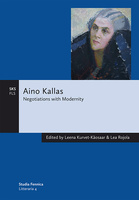Aino KallasNegotiations with Modernity toimittaneet: Leena Kurvet-Käosaar, Lea Rojola
Within recent reconceptualizations of Finnish and Estonian canon of modernism and modernity, Aino Kallas (1878–1956) now belongs among the key writers and intellectuals of the first half of the 20th century. Her rich legacy consisting of novels, short stories, plays, cultural criticism and life writings testifies to her intellectual and aesthetic grasp of modernity and her varied modes of engagement with it. In the 1920s and 30s, Aino Kallas became an internationally renowned author and a selection of her work was translated into English. For her, participating in the immediate cultural debates in Estonia and Finland was a priority, yet her whole oeuvre is a negotiation between her more immediate contexts and the leading conceptual frameworks of aesthetics, geniality, knowledge, subjectivity, race, sexuality, nature, etc., circling in Europe at the end of the 19th and the beginning of the 20th century.
The collection, first one ever on Aino Kallas in English, highlights her significance to the artistic and intellectual horizons of modernity of Finland and Estonia as well as those of Scandinavia and Europe. Containing articles focusing on the question of female voice and echoes of feminist ecological thought in her fiction, a contrapunctual reading of her fiction and that of Isak Dinesen, her unknown manuscript “Bathseba”, the implications of existentialist thought for her work, Kallas’ engagement in her cultural criticism and life writings with decadent modernism, issues of race and heredity, subjectivity and borders, travel, ageing, her interpretation of Goethe, and the iconography of Kallas, the collection features the work of today’s leading Aino Kallas scholars in Finland and in Estonia.
|
